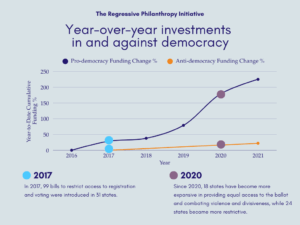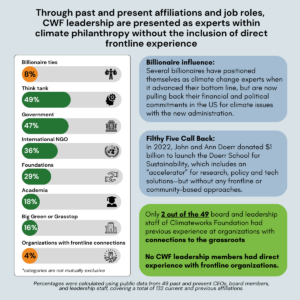Last week, the Times-Picayune reported that former U.S. Senator Mary Landrieu (D-LA) has assumed a new role since leaving office in December: paid strategic adviser to the Walton Family Foundation (WFF). Landrieu explained her role at the foundation in an interview,
“I’ll be working directly as a strategic adviser for the Walton Education Foundation promoting reforms in public schools, promoting choice and expansion of high quality charter schools. Most people are recognizing that New Orleans is one of the most exciting models for variety and choice that are producing new options and opportunities for educational success.”
The article also mentioned that Landrieu recently joined the board of the National Alliance for Public Charter Schools, a WFF grantee that happens to be celebrating National Charter Schools Week.
Not everyone is “excited” by the post-Katrina and Rita conversion of the NOLA school system to an all-charter district. In NCRP’s new video on Walton Family Foundation, education advocate Karran Harper-Royal describes how she and other parents were invited to draft plans for a new public high school, only to have the plans scuttled in favor of a charter school that, in her experience, was unable to serve children with special needs.
The video accompanies NCRP’s new Philamplify report on the Walton Family Foundation, which found that WFF uses an adaptive, effective approach in its marine conservation work, bringing unlikely allies to the table, engaging diverse constituencies and responding to local conditions. In contrast, WFF’s education strategy is focused almost singularly, as Landrieu says, on creating and expanding high quality charter schools, and also promoting state laws that create a more favorable (i.e. less regulated) environment for charters.
Philamplify’s assessment criteria ask: Does a foundation’s strategy advance equity? Does it benefit and also engage underserved communities in problem solving? Does it strive for long-term solutions to critical issues? WFF believes its education approach meets these criteria, and new data on charter school outcomes demonstrate some positive trends in math and English test scores. Yet, charters serve a mere 5 percent of all public school students, and not all students are served equally well by charters.
WFF’s education approach only engages constituents that are already pro-charter, leaving out the vast majority of public school parents, students and teachers, who all have a stake in thriving school systems that succeed in educating all students regardless of zip code, race, income, special ed label or English Language Learner (ELL) status.
If WFF did listen to a broader range of voices, it might discover that “choice” is a very low priority for many parents. In a recent poll commissioned by In the Public Interest and the Center for Popular Democracy, voters cite “lack of parental involvement, too much focus on standardized tests, cuts to school funding and class size as the biggest problems facing K-through-12 education. Lack of school choice ranks dead last on their list of concerns.”
For these reasons, the report’s author, Gita Gulati-Partee, finds that “The expansion of high-quality charter schools and related advocacy have created meaningful benefits for individual students and families, but have not achieved far-reaching, sustainable and equitable system-wide improvements.”
Gulati-Partee recommends that WFF “prioritize equity, quality and accountability across K-12 schools to fulfill deeply held Walton family beliefs about the value of academic achievement. Find ways to invest in traditional district schools that serve the greatest number of students, particularly those with the greatest need.”
Further, she urges WFF to “Embody the foundation’s commitment to ‘empowerment’ by authentically engaging members of communities most affected by issues it funds so that stakeholders can help determine the most effective strategies and solutions.”
Should Mary Landrieu advise the foundation to reach out to the 95 percent of families and teachers in traditional public schools and work with them to improve learning and school success? Tell us what you think!
Lisa Ranghelli is director of foundation assessment at NCRP. She also served as the primary researcher for the Philamplify assessment of the William Penn Foundation. Follow @NCRP and join the #Philamplify conversation on Twitter.





































































































































































































































































































































































































































